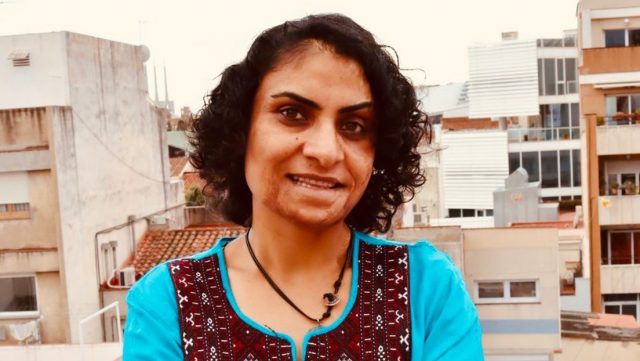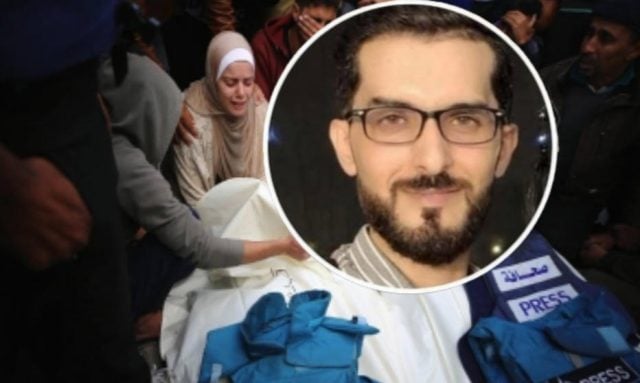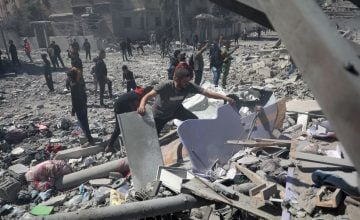Nadia Ghulam is an Afghan refugee writer and activist for the last 15 years in Spain. With a past marked by war and by the Taliban regime that settled in Afghanistan for five years in 1996, before the international ‘intervention’, now all her concerns are directed to Kabul, where her family still resides.
Ghulam, 36, knows very well what the regime change, that began in her native country last Sunday, can mean for women. When she was still a child, a bomb that destroyed her home seriously injured her and she remained in the hospital for months, according to a report by Nuria López for RT.
After her recovery and with the arrival of the Taliban to power, she made a drastic decision when she was only 10 years old. She began to dress as a boy adopting the identity of her deceased brother so that she could go out and work to support her family. «I thought it would last a day and then I could recover my identity, and that day lasted 10 years», explains the interviewee about an experience that she reflects in her first novel: «The secret of my turban».
Nadia is incredulous
Ghulam is incredulous towards the facade that the Taliban leaders are exposing to the outside world: «Although they are showing a kind face towards women, everything is false, because they have cultivated fear in the heart of every Afghan woman», she says.
The activist maintains that the US has said that during their occupation they have helped Afghan women, but in reality during these years, in many towns and provinces of the country, assistance has not arrived and they have lived under oppression for decades.
She also highlights that in the image that has gone around the world of the Kabul airport crowded with people who wanted to flee the country, the vast majority were men, to which she asks: “Why do they want to escape if the pressure is on women?». For her, the explanation for this is found in the education that men have received in that society, which prompts them to leave the woman at home, supposedly to protect her, without being aware of the fate that awaits them.
For this reason, Ghulam asks the media to put all the emphasis on the situation of women, and the countries that are in a position to host refugees, let those be women and girls, because from now on they will not have any chance in their country .
“If they come first, when the men arrive later, they will not be able to have the same mentality of control over women, because women are already changed. She already knows freedom”, says the activist.
A slow recovery cut short
Nadia Ghulam regrets that the slow recovery that she was experiencing in Afghanistan has been cut short: “How long will it take to recover from all this situation that this war has caused? You can’t get back in two years what an hour of war has been (in your life)», she says.
She has been in Catalonia for 15 years, where she arrived with the help of a non-governmental organization. Since then, she has been able to complete her studies, she has written three novels and is on the board of directors of an NGO, ‘Bridges for Peace’, which among other functions aims to help Afghan children.
However, during this time she has had to undergo therapies and psychological treatments: «I am still a very vulnerable person. Things affect me a lot, if I hear a loud noise it is as if another bomb were dropped on me. They are invisible wounds», says this activist.
Call to the international community
Ghulam believes that the international occupation changed things somewhat in her country to the extent that she was accompanied by the cooperation of NGOs, although the armed intervention did not mean any improvement in the lives of the population.
Now, she hopes that, if only to whitewash its image, the Taliban will allow humanitarian cooperation and that the international community will facilitate and encourage it. «Give opportunities to women, empower them. Because we need doctors, psychologists, teachers», she says.
«We need scholarships so that Afghan women can go to study abroad and when they return to the country, they are prepared», says the interviewee, and affirms that this is also her wish: to be able to return to her country one day to help her people. That is why she asks all universities in the world to promote and establish specific grants for Afghan women.
Nadia hopes to get her family out of Kabul
Since the taking of Kabul by the Taliban forces was precipitated last Sunday, August 15, Nadia Ghulam has all her senses placed in the Afghan capital. Her family still remains there. Throughout the week, she has been trying to arrange to expatriate her relatives to Spain. On Friday (August 27), she was still waiting for the call from the Foreign Ministry: «I’m counting the seconds», she says.
Her concern for her family, made up mostly of women, is extreme: «In the years that I have been here, all their needs were paid for by me, but now, they are desperate. They ask me for help», she says.
«My mother cannot come for health reasons, but I have a cousin, who is a widow and has two girls and a boy, and my mother asked me to bring my cousin in her place with my sister», said Nadia.
She also wants to get a cousin out of the country who is at risk because he has worked with her NGO helping women and girls in Afghanistan. «The people who collaborated with me are at risk», denounces Ghulam, and she explains that it is due to the relevance that her criticisms, have taken in recent times, of the regime.
Now, she talks to her family every day and they are concerned because «a lot of people are dying and they are going through a very bad time». Furthermore, “they don’t have basic services, the banks are closed and so are most of the stores. There is no water or electricity, administration issues are closed. Nothing is working”, she explained.
Ghulam says that she gets information that there are many armed people. «They enter and search the houses and the Taliban pressure people to say that everything is normal. There is a very strong pressure».
Fear
«I am very afraid that there will be a civil war. There are some warlords who now present themselves as democrats, but who have done a lot of damage to the Afghan people», explained Ghulam. In addition, she points to Islamist figures such as Gulbudin Hekmatiar, who she says «is worse than the Taliban and Al Qaeda and now, he wants to negotiate to gain power».
Hekmatiar was Afghanistan’s prime minister twice in the 1990s, before he was linked to drug trafficking. He has been described as the most brutal of the Afghan mujahideen and has been tried unsuccessfully on several occasions for crimes of genocide. Other names that are being considered for the formation of the new Government have very similar profiles.
And while, the word ‘fear’ continues to be repeated in the speech of this activist: “I am very afraid that the civil war will start because the Taliban are people with a lot of ignorance and therefore easily manipulated”, she argues.
The initial reaction of the international community does not inspire any confidence either, bearing in mind that everything indicates that there will be a recognition of the Taliban regime, with innocent declarations that perhaps the new regime that is establishing itself is «moderate».
However, “no one asks the Afghan people what we want”, Ghulam laments: “We cannot vote and if we do, it will never be free. We never wanted warlords as our leaders, but we have no choice».
Meanwhile, this activist continues to hope that her family will escape from a society that will return women to their homes and deprive them of work and education, forced to remain perpetually under the guardianship of men.











